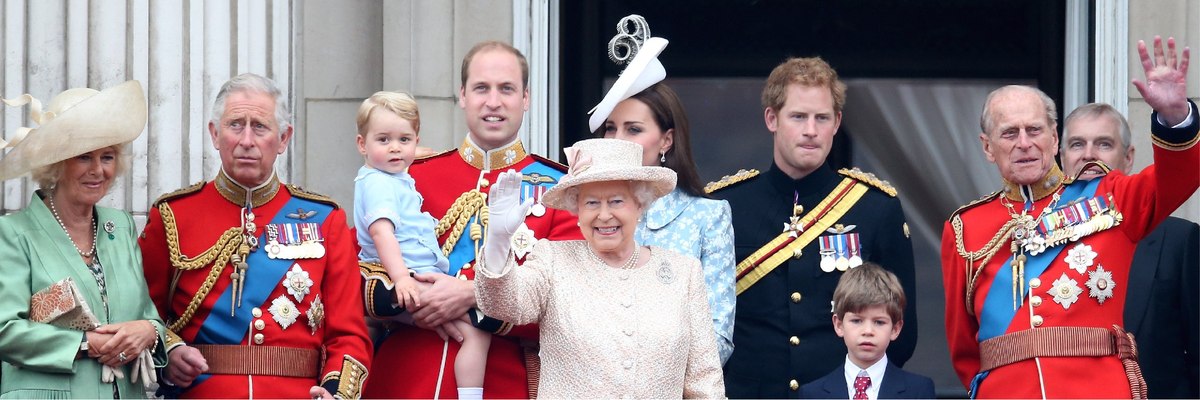Covid, as we know, has affected everyone, but it’s affected different people in different ways. There’s one group of workers who have been especially hit, left wholly unable to do what they do to earn a living, yet whose plight has attracted surprisingly little attention. It’s the Royal Family. Their job is to rush around the country shaking hands with everyone, a gainful activity thoroughly kiboshed by the virus. As the highly abbreviated daily Court Circular testifies, they have been truly furloughed. Yet they have stayed in the news and not wholly as they might have wished. So just as other Covid-induced sudden changes in our way of life have invited questions about whether we want to return to the status quo ante or whether we might prefer something different, is now the time to ask: ‘what sort of Royal Family do we want?’
To some people, of course, the immediate response to such a question would be to challenge the premiss. They don’t want a Royal Family of any kind because they don’t want a monarchy. So the question of ‘what sort?’ does not arise. They may feel the summer’s headlines about the antics of Harry and Meghan in sunny California or about the still very dark clouds hanging over Andrew, holed up at Windsor, will have served to recruit more supporters to their cause. That may be so but now, I’d suggest, is not a time when this more fundamental issue – hereditary monarch or elected president? – is going to get much of an airing.
There’s an obvious reason for this. Even ardent republicans recognise that with the Queen in the ninety-fourth year of her life and the sixty-eighth of her reign, and with respect and affection for her at stratospheric levels, this is perhaps not the best time to be talking about tumbrils. When Charles succeeds it may (or may not) become more of an issue, but it might have to wait until King William V – and even then there may be no more real pressure to abolish the monarchy than there has been since we tried it before, when Oliver Cromwell cut off Charles I’s head. Prince William and his wife and children seem to be setting themselves up to keep the show on the road. We simply don’t know what will happen.
But if the future of the monarchy as an institution is not currently in question, the issue of the Royal Family is. And this goes back to the abrupt cessation of hand-shaking and those newspaper headlines. Put starkly, you could ask: what is the point of the Royal Family if there is no hand-shaking; or if there are some members who announce they don’t want to be bothered doing it any more and slope off to a life easier on the hands; and while another has had all his hand-shaking duties cancelled and has to be kept so much in the shadows that he can’t even be photographed at his own daughter’s wedding? In short, how much of a Royal Family beyond the monarch herself do we actually need?
A hundred and fifty years ago the answer to that was clear. We needed a very large Royal Family and the amorous Victoria and Albert duly obliged. Back then there needed to be lots of young royals so that they could be married off among all the other royal families of Europe and so keep Europe ‘in the family’ so to speak. It was actually a growing business. New nations emerging from under the yoke of the Ottoman Empire were always on the look-out for an authentic monarch to come and rule them. You could say that Victoria and Albert turned themselves into ‘Suppliers of Monarchs to Nationalists’. They did very well out of it even if it led, in 1914, to cousins declaring war on each other. Now, though, the business has been pared back from breeding to mere hand-shaking. And the issue is: how many hand-shakers do we need?
One person who has given a clear if implicit answer to this question is perhaps the greatest hand-shaker of them all: Princess Anne, who turns seventy this weekend. There is no more dutiful and assiduous hand-shaker in the whole Windsor clan. For years she has topped the list compiled by earnest readers of the Court Circular of the number of official engagements conducted by each member of the Royal Family. For those few of you who don’t read it I can report that, pre-Covid, it would be standard stuff for Princess Anne to spend a morning, say, in Wales, opening a hospital and visiting a Save the Children Fund charity shop, then rushing over to Northumberland to launch a lifeboat and have a cuppa at an old people’s home in the afternoon before fetching up at a livery dinner in the City of London in the evening. All in a day’s work – day after day. Lockdown must have seemed to her a welcome break. Meetings went on, but the Circular reported them as ‘by video link’.
You might think that with such demands on her time she’d want a large Royal Family to share the work. But, apparently, not a bit of it. She was adamant from the outset that her own children should not join ‘the Firm’. They should be left to live whatever lives they wanted without being obliged on hereditary grounds to become professional handshakers. So there would be no titles for them, no HRH’s. Young Peter and Zara would be simply Mr and Miss Phillips. And they would make no demands on the public purse. They could ‘escape’.
It’s hard not to imagine that Prince Harry may have felt a certain envy of the freedom enjoyed by his Phillips cousins and that this may have affected his own attitude to the family profession. But he also appeared rather to enjoy the hand-shaking. And, at least initially, it was supposed that in marrying him and joining the Royal Family, Meghan Markle fancied a bit of hand-shaking too – why else would she join since that’s what they ‘do’? Maybe she was misinformed. It would now appear that she thought she could become a duchess and an HRH without having to put on the white gloves.
It’s possible, though, that in a typically British way of seeing everything from a Britain-centric point of view, we’ve got all this the wrong way round. It wasn’t so much that Meghan married into the Royal Family as that Harry married into the family of Hollywood celebrity. There’s not so much hand-shaking required over there. You can join the family and spend more time lounging by the pool. His great-great uncle, Edward VIII, enjoyed thirty years of a similar post-hand-shaking idyll in Paris. Admittedly his ‘HM’ was reduced to an ‘HRH’ but you can’t have everything.
Economics is all about supply and demand, and supply is often determined by demand. So the question of how many royal hand-shakers there ought to be is really determined by the number who feel a desperate need to shake the hands of a royal. The greater the cemand, the more royal handshakers there will need to be. And there is also an issue of quality control. To some people it wouldn’t be quite the same thing to shake the hand of Mr Peter Phillips as to shake the hand of his cousin, Eugenie. They are identical in the sense that they are both grandchildren of the Queen but she is an HRH and he is not. So, beyond mere genetics and heredity, we may feel the need for more HRHs simply to be sure we’re getting the genuine article.
And in the end it isn’t just hand-shaking that we want supplied. The Royal Family also acts as purveyors of goods to tut-tutting voyeurs. They are there to keep the gossip columns stocked. If William and Kate’s children, George, Charlotte and Louis, don’t make public exhibitions of themselves at trendy London clubs when they reach the age to do such things, whatever will be the point of them? And it’s only because they’ll be HRHs that they will be able to stimulate the tut-tutting – Princess Anne’s grandchildren, all commoners, could behave in exactly the same way and pass unnoticed. No paparazzi for them.
If the tone of this piece strikes some of you as disrespectful to the point of insolence, then I would plead that it’s to a purpose and a purpose which, at root, is actually rather more sympathetic to many of the individuals who happen to be members of the Royal Family. The point is this. Usually the question ‘Should the Royal Family be reduced in size?’ is couched in terms that are unflattering to its members, implying that there are loads of hangers on, leeches on the public purse, inheritors of ludicrous titles they do nothing to justify and expecting a deference they have done nothing to earn. ‘Cull them!’ seems to be the cry of the knitters at the base of the guillotine.
Maybe. But I’m suggesting there is another way of looking at it. It’s that the Royal Family – indeed the monarchy itself – exists only because enough of us want it to. It’s our demand for their ‘services’ that determines how many of them there needs to be and how differently from the rest of us they are expected to live. So it’s not so much, for example, that they require deference from us as that we require that they expect deference from us. It’s quality control again: we want to shake hands with an HRH not a mere mister.
Or at least we did. Like so much else, Covid has deprived us of this service for awhile. And, as with everything else we’ve done without over the last few months, the question arises – do we actually need this service or can we do with less or even none at all?
Let us know what you think.






